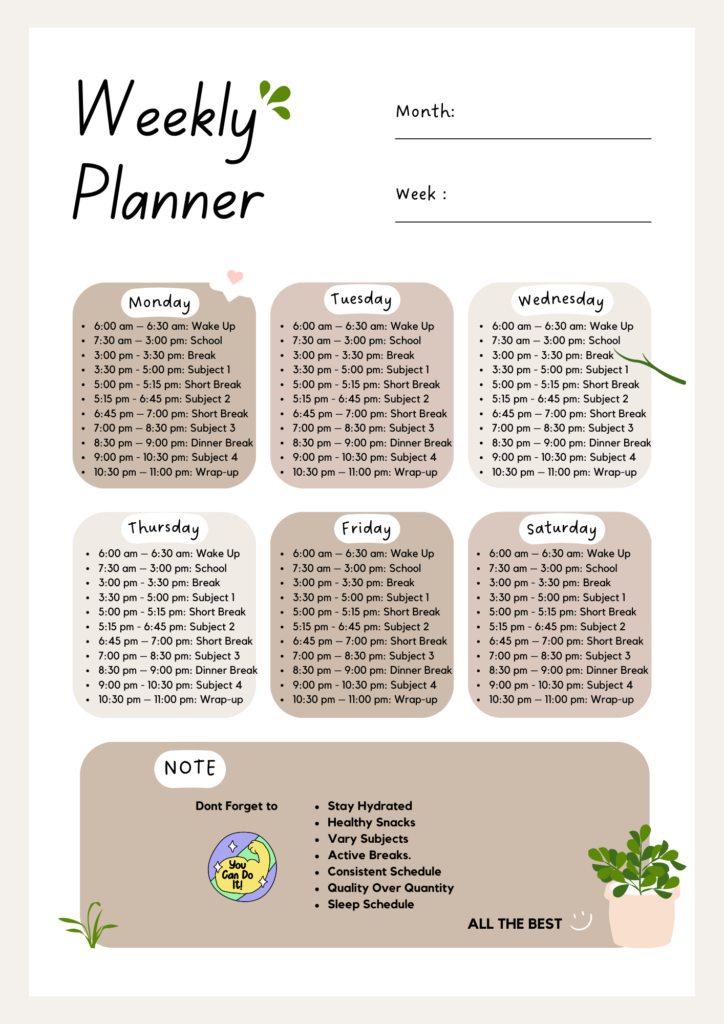
Step into the stress-free study zone! 😉
Preparation for the exams can be really hectic and stressful which makes it difficult to study properly. Having a well-planned study schedule is crucial for performing well on exams. To score high in exams, it is crucial to study smart rather than studying for long hours. That’s why this article introduces a smart 6-hour study plan for NEET, JEE and CBSE students. No more cramming – just effective learning along with school studies. Let’s learn how to balance study routine that maximizes productivity while minimizing stress.
latest – CBSE Board Exams 6-month Planner for 2023-24: Score 95% and Above!
6-hour study plan for JEE/NEET/CBSE
Creating a stress-free 6-hour study plan for JEE/NEET/CBSE after your school hours requires effective time management and a balanced approach. Here’s a plan that can help:
| Time | Activity |
|---|---|
| 6:00 am – 6:30 am: Wake Up | Wake up according to the school timing and get ready for the school. |
| 7:30 am – 3:00 pm: School | This is the time range between which school hours typically take place. |
| 3:00 pm - 3:30 pm: Break | Take a break of 30 minutes to relax and recharge after school and have lunch/snacks. |
| 3:30 pm - 5:00 pm: Subject 1 (1.5 hours) | Focus on the first subject you want to study. Allocate time for reviewing notes, solving problems, or learning new concepts. |
| 5:00 pm - 5:15 pm: Short Break | Take a 15-minute break to stretch, hydrate, and clear your mind. Remember to not use any electronics or social media as it will only drain you mentally. |
| 5:15 pm - 6:45 pm: Subject 2 (1.5 hours) | Move on to the next subject. Engage in active learning techniques like summarizing, teaching imaginary students, or solving practice questions. |
| 6:45 pm – 7:00 pm: Short Break | Spend 15 minutes engaging in a calming activity, such as light stretching, deep breathing, or a short walk. This will relax you and at the same time recharge your energy. |
| 7:00 pm – 8:30 pm: Subject 3 (1.5 hours) | Dedicate this block to the third subject. Focus on understanding complex topics and solving advanced problems. |
| 8:30 pm – 9:00 pm: Dinner Break | Spend this time with your family and have a nutritious meal to refuel your body and brain. |
| 9:00 pm - 10:30 pm: Subject 4 (1.5 hours) | For the last study session, you can either pick up the fourth subject or use this time to review the subjects you've studied during the evening. Recap key concepts, formulas, and important points. |
| 10:30 pm – 11:00 pm – Wrap-up | Finish your study session for the day. Spend a few minutes planning the next day's study goals and materials. Go to Bed. |

General Tips
Here are some tips to for you to follow to maximize the efficiency of your study plan and learning.
- Stay Hydrated: Keep water or healthy beverages nearby to stay hydrated throughout your study session.
- Healthy Snacks: If you need a snack, opt for light and nutritious options to maintain your energy levels. Such as fruits, nuts etc.
- Vary Subjects: Rotate subjects to prevent monotony and keep your mind engaged.
- Active Breaks: Use short breaks for light physical activity or relaxation techniques to rejuvenate your mind.
- Consistent Schedule: Stick to your schedule to create a routine that minimizes stress.
- Quality Over Quantity: Focus on understanding concepts deeply rather than rushing through material.
- Sleep Schedule: Ensure you’re getting at least 7 hours of sleep for optimal cognitive function the next day.
Also Check – Ideal Study Timetable for Class 12 Science Stream
Remember that the key to success lies not just in the amount of time you spend studying, but also in how effectively you use that time. Adjust the plan according to your preferences and learning style, and make sure to listen to your body and mind – if you’re feeling overwhelmed, take longer breaks or adjust the study duration as needed.
All the Best!





























